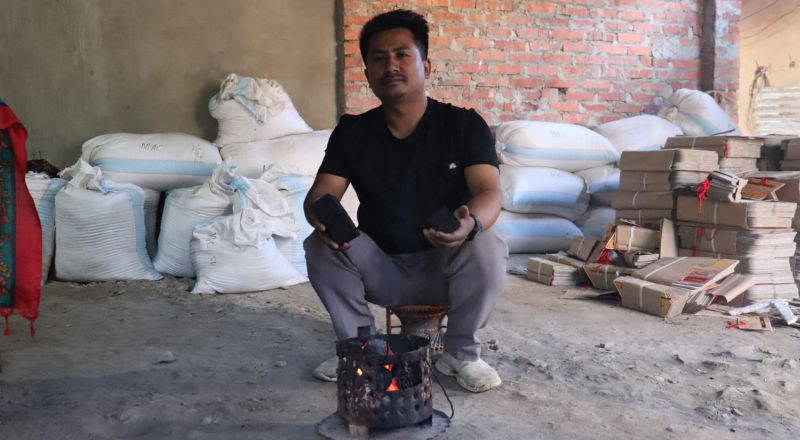The widespread practice of deforestation globally has exacerbated global warming, posing a critical environmental challenge as trees are cut down for various purposes, leading to increased greenhouse gas emissions.
The cutting down of trees for charcoal is one of the major factors of deforestation in Manipur amid the demand of charcoal by the masses to keep themselves warm and for cooking purposes in the cold winter season.
In a ground breaking demonstration of innovation harnessing the power of science and technology, Marchis Moirangthem, a 31-year-old science teacher from Ningthoukhong Leipung Bazar, Bishnupur district in Manipur has emerged as a trailblazer in the pursuit of a greener future.
He has successfully pioneered a groundbreaking method to produce eco-friendly charcoal from rice husks, waste paper and flour. He started the initiative in September, 2023.
Speaking exclusively to the Imphal Free Press, Marchis shared insight into the inspiration behind the groundbreaking initiative, stating “I wanted to demonstrate that even simple agricultural by-products can be turned into valuable resources with the right application of science and technology.”
Marchis’s ingenuity lies in the application of simple science that converts rice husks, traditionally considered agricultural waste, into a valuable resource.
This eco-friendly charcoal production not only reduces the environmental impact of burning husks but also offers an alternative to conventional charcoal derived from deforestation and nevertheless it is more cost efficient than the charcoal obtained from cutting trees.
The teacher goes on to explain the intricacies of the process, emphasising the strategic use of scientific principles and advancements in biomass conversion and energy-efficient technologies.
Stating that the whole process of making the eco-friendly charcoal takes four days, he explained the intricacies of the process involving carbonisation of the rice husk, cooling, grinding, mixing with waste paper, flour and followed by compressing and drying.
The normal process of directly burning down the rice husk can produce a lot of harmful gases such as nitrogen oxide, silicon dioxide, sulphur dioxide but the process of indirectly heating the rice husk using a furnace releases the least amount of hazardous gases, he explained.
“By combining knowledge with hands-on application, we can address pressing environmental challenges and inspire the next generation of innovators,” he said.
 (PHOTO: IFP)
(PHOTO: IFP)
Beyond the immediate positive environmental impact, the initiative promotes a circular economy by repurposing agricultural by-products. This not only reduces the carbon footprint associated with waste disposal but also provides a sustainable source of energy, aligning with global efforts to combat climate change.
Marchis and his brother Gupta Moirangthem, the driving forces behind this eco-friendly initiative, have been diligently crafting the environmentally conscious charcoal in their backyard.
They have successfully transitioned many of their neighbours to this eco-friendly option but their limited scale, manual operation has limited their production capacity and growing demands.
In a month, they manage to produce only 80 kilograms of this eco-friendly charcoal, with each kilogram containing 16 bricks, which they are unable to meet the demand for sales.
The success of their initiative is undeniable, but the duo faces a significant hurdle, the lack of investment.
“This financial constraint prevents us from scaling up our production to meet the increasing demand as the production process, relying solely on manual labor and it hinders our ability to make a more substantial impact on the environment,” said Marchis.
Marchis envisioned a broader use of his eco-friendly charcoal, emphasising the need for sustainable alternatives to traditional charcoal production methods.
He recognised the pressing environmental challenges posed by widespread deforestation and hopes that his innovation can contribute to mitigating these issues.
Despite the obstacles, Marchis remains optimistic about the potential impact of his eco-friendly charcoal on a larger scale.
He appealed for support from the community, local authorities, and potential investors to provide the necessary resources for procuring machinery and employing manpower.
This, he believes, will enable them to transition from a modest backyard operation to a large-scale production facility, making eco-friendly charcoal accessible to a wider audience.
The story of Marchis Moirangthem exemplifies how individual initiatives with simple science can lead to transformative changes in environmental practices. As the demand for sustainable solutions grows, the success of small-scale innovators like Marchis could pave the way for a more eco-conscious future.
It also highlights the importance of integrating science and technology into practical solutions that benefit both local communities and the planet at large.